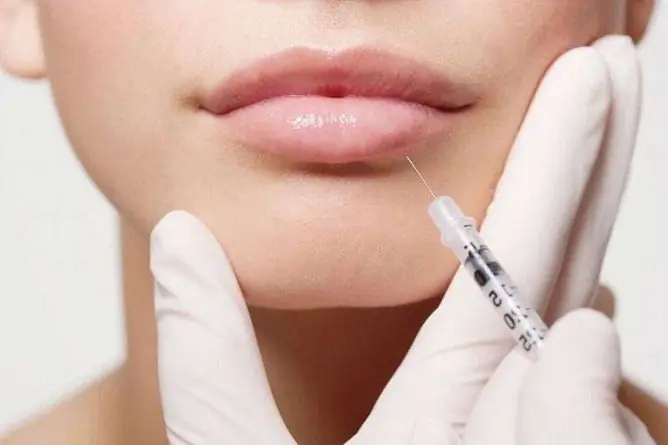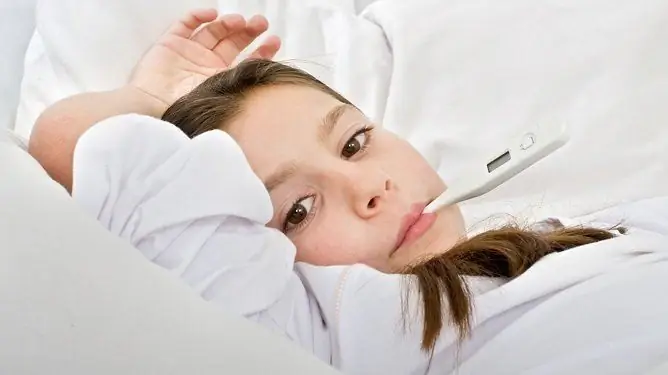- Author Rachel Wainwright [email protected].
- Public 2024-01-15 19:51.
- Last modified 2025-11-02 20:14.
How long does menopause last
The content of the article:
- The timing of the onset of menopause
-
How long does the menopause in women last?
- Premenopause
- Menopause
- Postmenopause
-
How does it manifest
- Early symptoms
- Moderate symptoms
- Late symptoms
- How to ease the course of menopause
- Video
Menopause is a physiological period in a woman's life, which is characterized by a gradual decrease in the production of female sex hormones by the ovaries. In some women, this period is easy, without pronounced discomfort, in others, the manifestations of menopause are more pronounced and significantly disturb the general well-being. How long menopause lasts depends on many factors - the individual characteristics of the organism, heredity, the time of its onset, the presence of concomitant diseases.

Climax lasts for everyone in different ways, on average from 5 to 8 years
The timing of the onset of menopause
As a rule, menopause occurs at the age of 50, in this case we are talking about its timely onset. With a timely menopause, a woman can face the first manifestations of menopause as early as 45-47 years old.
Recently, however, more and more women are faced with the onset of menopause at an earlier age. The reason for this may be poor ecology, smoking, gynecological and endocrine diseases.
Depending on age, the following types of menopause are distinguished:
- premature - occurs before the age of 40;
- early - up to 45 years;
- timely - 45-55 years old;
- late - after 50 years.
In this case, menopausal symptoms usually begin several years before the cessation of menstruation.
Artificial menopause is considered separately, the cause of which is not the extinction of the hormone-producing function of the ovaries, but the surgical removal of the uterus with appendages.
How long does the menopause in women last?
The duration of menopause varies greatly depending on individual characteristics. The duration of menopause can be influenced by heredity, the number of births, bad habits (especially smoking), concomitant diseases and the general condition of the body. On average, menopause lasts 5-8 years from the moment the ovarian estrogen production begins to decrease. The course of menopause can be divided into 3 periods - premenopause, menopause and postmenopause.
Premenopause
The first symptoms of menopause appear during the menopausal transition. At this stage, there is a decrease in the production of sex hormones by the ovaries, however, the estrogen deficiency is not yet very pronounced. The woman's body is trying to adapt to the changed conditions. The main manifestation of menopause is a violation of the menstrual cycle - its duration changes, menstruation becomes irregular. Other symptoms may occur, but in mild form. Women usually experience premenopausal changes at the age of 45. The duration of premenopause is 3-5 years on average.
Menopause
Menopause begins at the time of the last spontaneous menstrual period and lasts 12 months. The fact of the last menstruation is established retrospectively after 1 year. Most menopause occurs at the age of 50. This stage is characterized by the extinction of the hormone-producing function of the ovaries, the level of estrogen in the blood is sharply reduced. Deficiency of estrogen causes the development of climacteric syndrome. In the menopausal period, the early symptoms of menopause are pronounced - hot flashes, psychoemotional disturbances, weight gain, changes in the skin. Climacteric phenomena are more pronounced with a sharp onset of menopause, when the body has not yet had time to adapt to the deficiency of sex hormones.
Postmenopause
1 year after the onset of menopause, a new period begins in a woman's life - postmenopausal. Postmenopause lasts until about 75 years of age, when estrogen production stops completely. However, the symptoms of menopause disappear earlier. Hot flashes and emotional disturbances disturb the postmenopausal woman for another 1-2 years, and then the menopause ends. However, postmenopausal women are more at risk of developing osteoporosis and cardiovascular disease.
How does it manifest
In some women, menopause is physiological, without any disturbing symptoms. But still, many women are faced with the manifestations of menopause. The appearance of all changes is associated with a deficiency of estrogen, during menopause all estrogen-dependent organs suffer - the uterus, mammary glands, urogenital tract, brain, skin, heart and blood vessels, bones. All emerging symptoms can be divided into 3 groups: early, medium and late.
Early symptoms
The early signs of menopause appear already in premenopause. They include autonomic and neuropsychiatric manifestations.
The main sign of vegetative disorders is hot flashes. Hot flashes are felt as a sharp feeling of heat, which is localized mainly in the upper half of the body. Feeling hot during hot flashes may be accompanied by increased sweating. Other autonomic disorders include:
- blood pressure surges;
- orthostatic hypotension;
- dizziness, sudden weakness;
- excessive sweating.
The early signs also include neuropsychiatric syndrome - mood changes and cognitive disorders. The climacteric syndrome is characterized by sudden mood swings, increased irritability and fatigue, and sleep problems. A woman in this period begins to notice that some little things, which were previously perceived quite calmly, are now brought to tears or aggression. Cognitive functions are impaired: it becomes more difficult to concentrate and remember new information.
Moderate symptoms
Medium-term symptoms include urogenital disorders and skin changes. Urogenital disorders are a complex of symptoms from the lower parts of the genitourinary system. Menopausal women may experience the following urogenital symptoms:
- dryness in the vagina;
- dyspareunia (pain during intercourse);
- burning and itching in the vagina;
- urinary incontinence;
- frequent urge to urinate.
The skin becomes drier and thinner, its elasticity decreases, and wrinkles appear. Due to metabolic changes, a woman can rapidly gain weight, while fat is deposited mainly in the abdomen.
Late symptoms
Late symptoms can occur even 5-10 years after menopause. These include changes in the cardiovascular system and bone tissue.
In the first few years after menopause, bone loss occurs, which is associated with a deficiency of estrogen in the body. Bones become more fragile, leading to osteoporosis and frequent fractures in old age.
How to ease the course of menopause
It is impossible to completely prevent the appearance of menopause, since this is a physiological stage in a woman's life. But to delay the onset of menopause or ease its course is quite possible. It should be understood that you need to start taking care of your health from the reproductive age. It is important to regularly visit a gynecologist, lead an active lifestyle, play sports, and eat right.

Exercise helps manage menopausal symptoms
Treatment can include several components: taking phytoestrogens, symptomatic treatment, and hormone replacement therapy.
| Treatment method | Explanation |
| Phytoestrogens | Some plants and foods contain phytoestrogens - plant estrogens. Their reception somewhat facilitates the course of climacteric syndrome, however, phytoestrogens are not able to fully cover the body's needs. Phytoestrogens are found in flax seeds, whole grains and bran, peas, beans, and lentils. |
| Symptomatic treatment |
To relieve some of the symptoms, medications are prescribed: 1. Antidepressants (selective serotonin reuptake inhibitors) for depressive disorders and other psycho-emotional disorders. 2. Bisphosphonates for the treatment of osteoporosis. 3. Local estrogens for the treatment of urogenital disorders. |
| Hormone replacement therapy |
In severe menopause, systemic hormone replacement therapy is prescribed - an internal intake of estrogens. Substitution therapy allows you to make up for the estrogen deficiency, which leads to the elimination of the symptoms of menopause. There are several types of hormonal drugs: 1. Monopreparations of estrogens - prescribed for women with artificial menopause (after removal of the uterus with appendages). 2. Two- and three-phase combined preparations containing estrogens and gestagens - are prescribed for women in the early period of menopause. 3. Monophasic combined preparations containing estrogens and gestagens - prescribed in postmenopausal women. |
Video
We offer for viewing a video on the topic of the article.

Anna Kozlova Medical journalist About the author
Education: Rostov State Medical University, specialty "General Medicine".
Found a mistake in the text? Select it and press Ctrl + Enter.






